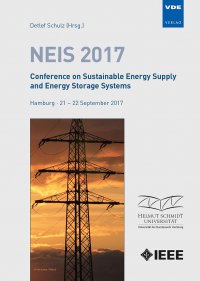Economic Optimization of Self-consumption of Generated PV-energy by using Energy Storage Systems and the Influence on Energy Supply Costs
Conference: NEIS 2017 - Conference on Sustainable Energy Supply and Energy Storage Systems
09/21/2017 - 09/22/2017 at Hamburg, Deutschland
Proceedings: NEIS 2017
Pages: 6Language: englishTyp: PDF
Personal VDE Members are entitled to a 10% discount on this title
Authors:
Mussenbrock, Konrad; Abend, Jonathan; Lehrer, Timo (Hochschule Aschaffenburg, University of Applied Sciences)
Abstract:
Concepts for on-site use of decentralized generated electricity from renewable sources are being discussed, frequently evaluated and published. Energy-Storage-Systems will have a significant role to play in this development. A model for the economic optimization of the total costs for the supply of electrical energy resulting from the integration of a battery into a PV Generation is presented in this article. The model takes into account the interaction of battery storage system costs, the active management of demand and the amount of renewable self-production. Starting from the current load characteristic and a PV system (PVS) individually dimensioned for the user, interaction effects with the technical conditions of a battery storage system are modeled. The contribution regarding the cost reduction as well as the lifetime of the battery have an interaction which has a significant influence on the profitability of the total investment. The use of such a system as a flexibility option is the general target of the approach. The battery is used to optimize the load curve by means of the interaction with the energy management of a company and thus the total costs. The integration of the batteries of electric driven fork lifts in the energy management is shown as an advanced application. The solution presented here is an integrated approach that takes into account the models that are known in the relevant literature, integrates them, and closes gaps between the existing solutions.


